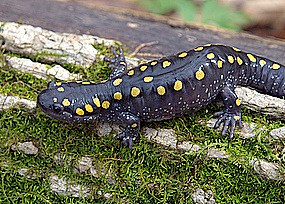
Bryan Gorsira
Amphibian comes from the Greek words "ambi" meaning dual and "bios" meaning life. Amphibians lead a dual life in that most spend some of their early life in water and metamorphose into an adult form for life on land. Amphibians are the most diverse group of terrestrial vertebrates because they occupy every continent except Antarctica. The class “Amphibia” contains over 4,800 species. They include: frogs (toads and tree frogs), salamanders (including newts), and caecilians (which live in the tropics). Fossil evidence indicates this branch of vertebrates has been around for 350 million years since the Devonian Era. They are cold-blooded creatures and are adapted to live in wetlands, forests, deserts, savannas, tree canopies, rain forests, and underground. Amphibians provide many benefits for the environment and for humans, including:
Amphibians transport water and air primarily through their porous skin. This is the reason amphibians are used in biomonitoring studies. Whatever toxins are placed in our freshwater systems affect amphibians health and their population dynamics. It might be easier to imagine that the air we breathe is flooded with a gas that is slightly toxic to us. Breathing this air would put our health at risk and our bodies would be put under a considerable amount of stress. With this increased stress comes an increased chance of succumbing to a disease. The same thing is happening to amphibians. Biocides (mimic/interfere with hormones), leached heavy metals, petroleum products, aerial spraying, increased UV-B radiation and acid rain are all having a harmful affect on the worldwide amphibian population. Some rapid population declines and extirpations have even occurred in protected parks and wilderness areas. |
Last updated: April 10, 2015
